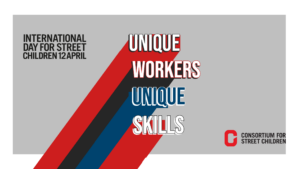12th of April is The International Day for Street Children. It is a day to raise awareness of street children’s realities and respect for their rights in all parts of the world. This year, we want the international day to acknowledge those who work directly on the street with them.
Throughout the pandemic, frontline workers have had to take extraordinary measures to ensure that street-connected children did not see vital care and services interrupted. Mobility restrictions posed a challenge to the existing networks that street workers had established to facilitate the delivery of their activities and services.
We are excited that so many organisations want to celebrate the valuable work that frontline workers carry out. Here are seven reasons why we think you’ll want to join us in celebrating them on International Day for Street Children.
-
They build trust
Frontline workers know that street social work is about establishing trust and creating a safe environment for street children. They show compassion and friendliness, ensuring that their relationships with the children are based on mutual respect and admiration.
Street social workers know the field better than anyone else. They are the first point of reconnection with a community they have often lost faith in, are referral points for other services, and they are messengers needed to understand street-connected children’s situations fully. By supporting street social workers in this work, decision-makers can design more appropriate specialised interventions for children in street situations.
-
They listen
Because social work requires direct contact with many street-connected children and people, they become skilled at developing good interpersonal relationships and strengthening these connections. Frontline workers can handle situations that can be a source of tension by displaying friendliness and sympathy towards other people, good humour, the ability to know, to listen, the ability to express oneself and to convince, the ability to communicate, the ability to be welcoming, openness and availability.
-
They do not require professionalisation to be professional.
Street workers can be formal and informal – both have the same merit and deserve the same respect. Often those who are close enough to work closely with street children do so without any prior degree or qualification. They learn on the ground in a blended process involving practice and training courses. However, regardless of their background, they are individuals who are fully committed to the best interests of the street children and are guided by high standards of care and protection towards them. Those who work with street-connected children are the first point of contact for delivering services to them.
-
They multitask
Street work requires many different skills which allow the street worker to adapt to the immediate scenario. They are not only service providers but also mentors, therapists, teachers, caregivers, legal champions, leaders, listeners, and more. They engage in multiple roles to break down boundaries so that street-connected children can rebuild trust in a world which has failed them.
Sometimes, the street workers themselves have experienced living on the streets, thus giving them a unique skillset and knowledge. -
They provide essential services
The services provided by frontline workers blur the boundaries between mainstream society and marginalised groups such as street-connected children. They enable services to become more accessible in ways tailored to street children’s needs in terms of accessibility, methods, and settings. Therefore, their frontline work turns them into powerful actors to generate real social inclusion and remove the barriers between social policies and social change by opening spaces for the involvement of street-connected children. If it were not for frontline workers and their willingness to be with street children when they need them most, many would neither have access to essential services nor be able to learn about forms of exercising their rights.
- They believe in street -connected children
Street social workers know better than anyone that street children are not victims but active agents in writing a better future for themselves. They act with the conviction and confidence that children can play a leading role in their development. -
They overcome obstacles
All social action work faces difficulties and obstacles, such as rejection, apathy, ingratitude, non-compliance with planned activities, among others. Despite the hardship, frontline workers persist.
People assume street work is a simple thing to do. But in practice, it is a 24/7 job that is demanding and intricate.
It is a job that requires to a large extent, affection, and protection for all the street children and young people with whom they collaborate. Street workers have a common identity despite different contexts. Respecting child rights is a mindset.
Therefore, we wish to highlight that their work does not go unnoticed, and we are confident that they are positive role models not only for the street-connected children but also for us.
